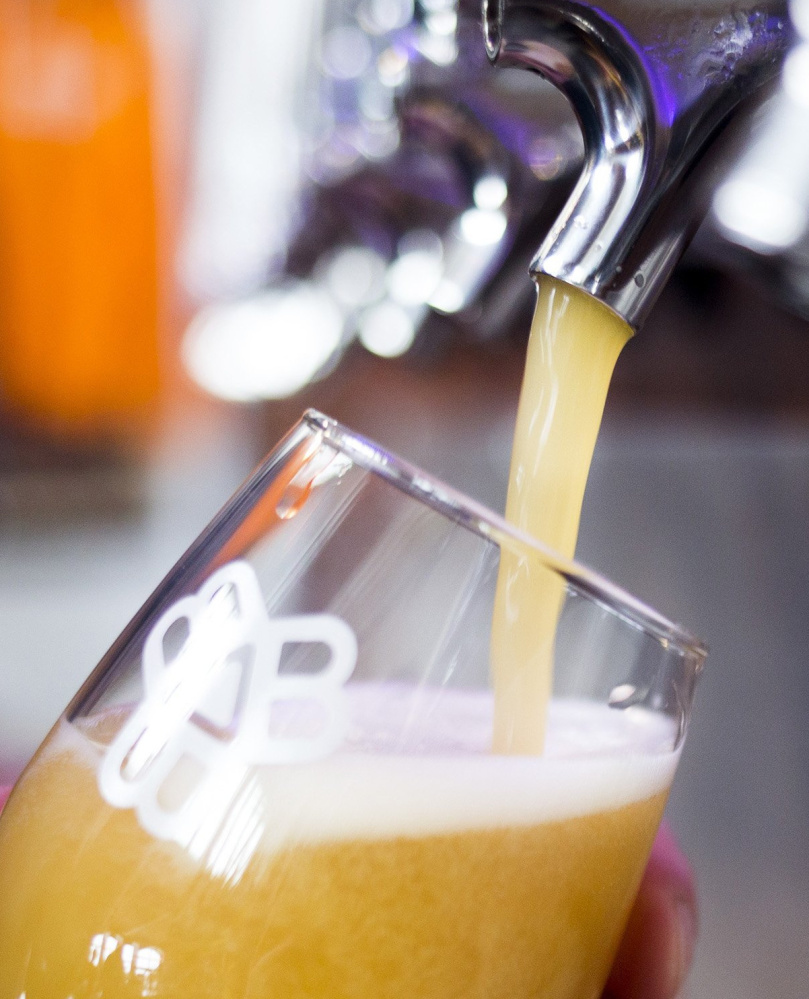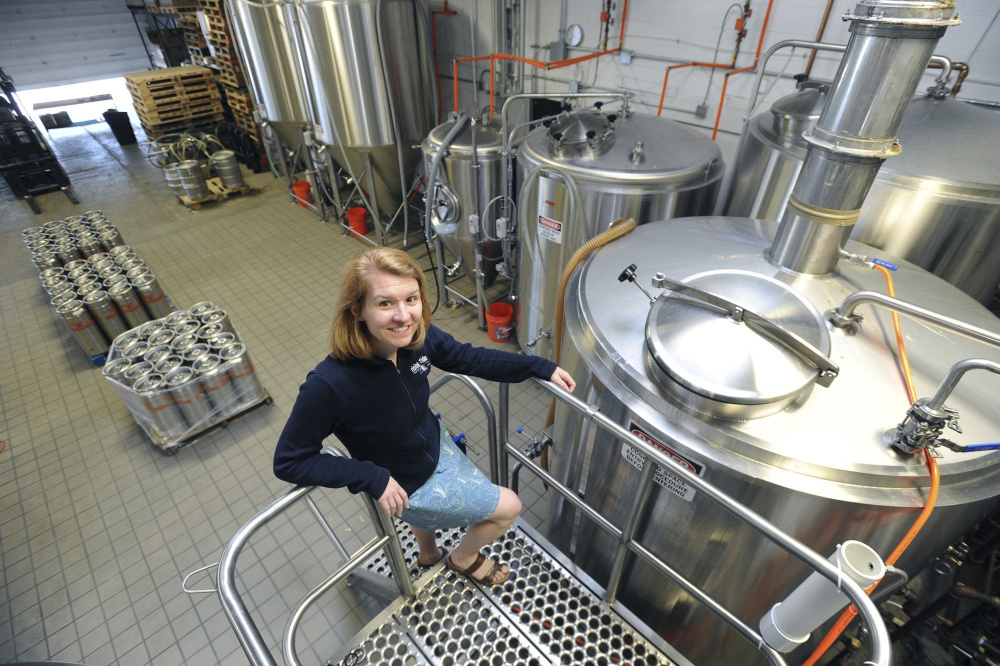AUGUSTA — Craft beer brewers testified at the State House on Monday on a six-pack of bills aimed, in large part, at providing new expansion opportunities for Maine’s already booming craft beer industry, changes that are opposed by some distributors and the state’s liquor agency.
Among other law changes, brewers want to be able to transfer their own ales and lagers between multiple breweries and tasting rooms without fear of violating state law. Other bills before the Legislature’s Veterans and Legal Affairs Committee would allow more specialty food stores to hold occasional taste-testings and sample offerings and double the amount of beer, wine or hard alcohol a producer or distributor can provide to a retailer for samples.
Beer brewers from Portland and beyond told committee members that inconsistency between state and federal laws regarding beer transfers between breweries owned by the same company could have a chilling effect on growth. Some fear the state’s agency that regulates alcohol could crack down on a practice that some brewers currently employ to move beer from one brew facility to another for sales, either in tasting rooms or for off-premise consumption. Craft brewers want to be able to transfer their beer by tanker truck, keg or can.
Opponents to the change include the Bureau of Alcoholic Beverages and Lottery Operations, which argues that Maine could be ceding its authority to regulate its brewers if it passes the bill calling for the state to mirror federal law.
Greg Mineo, the director of the bureau, said the law change for transfers is written in a way that could have unintended consequences. “If we weigh it as written, it defers the state’s autonomy to the federal government,” he said.
The craft beer industry has expanded dramatically in Maine, as it has around the country. The state’s industry has grown from about 19 breweries to more than 90 in the past two decades, according to one longtime brewer. Portland, which is home to well over a dozen breweries, has been ranked as the No. 1 craft beer town in America because it has the most breweries per capita.
But growth in Maine’s craft brewing industry has put traditional bars and restaurants on guard since a 2011 law allowed beer makers to also sell beer to drink in tasting rooms, where serving sizes can range from 4 to 16 ounces, or to take home. Some have argued the law gives the brewers an unfair advantage over traditional retailers, including bars, which are only allowed to sell liquor for consumption on site and cannot sell beers to go.
The newest round of legislative proposals is making beer distributors uneasy about the possibility that craft beer makers are building their own distribution system and cutting into their business.
Rep. Heather Sanborn, D-Portland, who co-owns Rising Tide Brewing Co. with her husband, said a law change that allows brewery owners to transfer beer from one facility to another will be key to a product expansion for her Portland business as it looks to move into barrel-aged beers.
The expansion would involve two separate licensed breweries located in the same building and separated by only 130 feet. Keeping the two kinds of beer in separate breweries is important because each type of beer is made by different processes and uses different strains of yeast that can contaminate the other, she said.
Sanborn said it’s unclear under current state law whether she could transfer the beer made in one brewery to the tasting room of the other so that it could be sampled and sold. Sanborn and other brewers testified that they are worried the state agency responsible for alcohol enforcement, the Bureau of Alcoholic Beverages and Lottery Operations, could decide to stop the beer transfers, which are allowed under federal law.
Being able to transfer beer made at different breweries also is important so brewers don’t have to invest in costly canning equipment at each location where they brew beer and instead could transport their product to their canning or bottling facilities wherever they exist in Maine, they said.
Peter Bissell of Bissell Brothers Brewing Co., another Portland craft beer maker, said his growing company also is hoping to expand into a new line of beers and wants to do so in Bissell’s hometown of Milo, in northern Maine’s Piscatiquis County. But before making that investment, Bissell said his company needs know that it will be able to sell beers made in both Milo and Portland in either location.
Bissell said without knowing for certain that beer canned in Portland can be sold in Milo, they wouldn’t be able to make their plans for a Milo expansion work financially.
Kai Adams, of Sebago Brewing Co., said his company regularly transfers beer from its Gorham brewery to its Portland brew pub for sale and has for years. Adams detailed a complex system of licensing and federal excise transfer and tax payments the company makes to keep the process legal, but he agrees with Sanborn, Bissell and the others that Maine law is generally silent on the issue of transfers.
Adams said, at best, the lack of clarity in Maine law is confusing for many brewers, some of whom will shy away from expanding their businesses or investing in growth.
Brewers like Abraham Furth, of Orono Brewing Co., said aligning Maine’s law with the federal law on beer transfer would give brewers confidence that they were legally able to transfer their products between their tasting rooms and other brewing facilities regardless of how they were packaged.
“If this bill passes, it will give us the confidence to continue to grow, allowing us to produce more beer, more jobs and more tax dollars,” Furth said. “We are a small brewery and we employ 17 people, we create tourism in our area and we have helped in the revitalization of Orono and Bangor by substantially improving two buildings and creating businesses that add to the vitality of the downtowns.”
Furth said Maine’s other small brewers were doing similar work all around the state, including in Portland, a craft beer hub that has grown steadily in the last decade.
When Sebago Brewing started in 1996, there were about 19 small breweries in Maine. That number has grown to more than 90 in 2016, Adams told the committee.
Other opponents of the transfer bill include the Maine Beer and Wine Distributors Association and beer-making giant Anheuser-Busch.
Lobbyists for both entities said they worried a change in Maine law could break down the state’s established three-tiered liquor distribution system – producers, distributors and retailers – especially if craft brewers are allowed to hold ownership in multiple breweries and transfer product between facilities.
While the owners of Maine’s small breweries say that wasn’t their intent, the committee’s Senate chairman, Garrett Mason, R-Lisbon, asked to organize a working group of stakeholders to find agreement that might work for all parties involved.
That bill and the others will return to the committee in the coming weeks for ongoing debate before the lawmakers decide whether or not to endorse the bills and send them to the full Legislature for consideration.
Scott Thistle can be contacted at 791-6330 or at:
sthistle@pressherald.com
Twitter: thisdog
Copy the Story LinkSend questions/comments to the editors.





Success. Please wait for the page to reload. If the page does not reload within 5 seconds, please refresh the page.
Enter your email and password to access comments.
Hi, to comment on stories you must . This profile is in addition to your subscription and website login.
Already have a commenting profile? .
Invalid username/password.
Please check your email to confirm and complete your registration.
Only subscribers are eligible to post comments. Please subscribe or login first for digital access. Here’s why.
Use the form below to reset your password. When you've submitted your account email, we will send an email with a reset code.